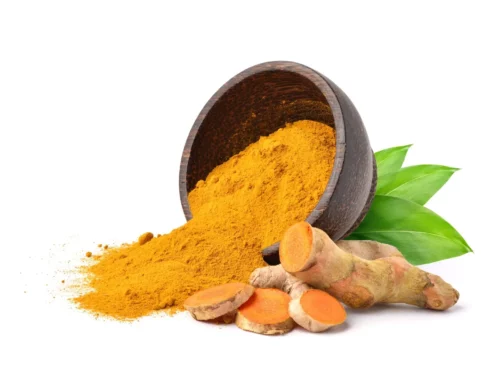
PolyCystic Ovarian Syndrome (PCOS) is characterized by high levels of androgens (testosterones) that can negatively impact your overall health.
While testosterones are an essential hormone that help with reproductive function, emotional well-being, muscle function and growth, libido, and much more, having an excessive amount can pose a problem.
Hyperandrogenism is when the androgen levels are higher than they should be. This can lead to abnormal hair growth, balding, acne, loss of libido, infertility, insulin resistance and weight gain to name a few.
While there are medicines and supplements that can be added to your daily regimen to offset some of these effects, many natural ingredients contain some of the vitamins and nutrients that can assist as well. This study from 2014 discusses the use of herbal medicine for the management of PCOS.
1. Nettle

Nettle (Urtica dioica) has amazing anti-inflammatory benefits, helps the body detox, and assists with hormone balance. All parts of this plant have been used for medicinal purposes.
The root of the plant is proven to have the ability to balance androgen and hormone levels. This medicinal herb works to optimize and stabilize the endocrine system, by binding to and removing excess androgen hormones in the body.
It is loaded with Vitamins, C, B, and K, as well as choline, calcium, and magnesium. In addition, it helps with immune support, hair regrowth, lactation, and provides an energy boost.
It is recommended that you take 240-250 mg once or twice daily between meals.
2. Zinc

Zinc improves ovarian function thereby decreasing androgens and increasing progesterone, which is a natural androgen blocker.
Zinc also downregulates the enzyme 5 alpha-reductase and therefore reduces the conversion of testosterone to dihydrotestosterone (DHT).
In a recent clinical trial, zinc supplementation significantly improved hirsutism in just eight weeks.
The recommended dose is 30-50 mg taken directly after dinner. Don’t take zinc on an empty stomach, or it could make you feel sick.
Read Why zinc is my favorite prescription for healthy periods.
3. Peony

Peony (Paeonia lactiflora) inhibits the production of testosterone and promotes the activity of the enzyme aromatase, which converts testosterone to estrogen.
Peony has been known to influence low progesterone, reduce elevated androgens, and modulate estrogen and prolactin. This is a key fertility herb that regulates ovarian function and improves ovulation.
When used in combination with licorice, it has been shown to modulate testosterone levels in PCOS. With prolonged use, the combination of these herbs help to improve pregnancy rates in those with PCOS.
The typical dosage for peony is 1-3 grams up to three times a day.
4. Licorice

Licorice (Glycyrrhiza glabra) has natural anti-androgen properties, helps with inflammation, keeps adrenal fatigue at bay, and boosts immune and endocrine system function.
The glycyrrhizic acid, which can be found in licorice root, has been shown to induce regular ovulation and is a major contributing factor to the anti-inflammatory benefits of this herb.
Licorice downregulates the enzyme (CYP17A1) that produces testosterone and contains phytoestrogens that downregulate androgen production and block androgen receptors.
Together with peony, the two herbs have the synergistic effect of normalizing pituitary hormones. Peony & licorice combination did well in a 2017 clinical trial for PCOS.
It is recommended that women with PCOS consume between 1-5 grams of licorice per day.
Licorice raises blood pressure, so consult a clinician about safe use.
5. Reishi Mushroom

Reishi mushroom (Ganoderma lucidum) inhibits 5-alpha reductase which is the enzyme that converts testosterone to the more potent DHT hormone.
Reishi mushrooms are rich in antioxidants, assist with reducing blood pressure, obesity, and high cholesterol, which can increase the risk of insulin issues. This natural anti-androgen has many other health benefits including immune enhancement and stabilization of the HPA (adrenal) axis.
When used in combination with the Maitake mushroom, they serve as an excellent treatment for PCOS insulin problems and improving gut health.
Dosage can vary depending on which form of the mushroom you are taking, however to take advantage of the antioxidant properties, a dose of 0.6 mg/mL would be ideal.
6. DIM

DIM (diindolylmethane) is a phytonutrient derived from vegetables such as broccoli, brussel sprouts, cabbage, and kale.
It acts as a natural anti-androgen by blocking androgen receptors. Because DIM inhibits the aromatase enzyme, it could have the unwanted effect of decreasing estrogen, but clinically, I’ve found it to be quite effective for both acne and hirsutism.
I would recommend a daily dose of 100 mg.

So, If you suffer from PCOS (PolyCystic Ovarian Syndrome) reaching for products that contain these herbs will make a great natural and safe remedy that can help get your testosterone levels back in balance.
PCOS can be managed naturally and safely with supplements catered to your specific hormone profile.
FDA DISCLAIMER – These statements and any information contained on this website have not been evaluated by the Food and Drug Administration. This information is intended for educational purposes only and is not meant to substitute for medical care or to prescribe treatment for any specific health condition. These products are not intended to diagnose, treat, cure or prevent any disease. Consult individual products labels for safety information.
THIS WEBSITE DOES NOT PROVIDE MEDICAL ADVICE – The information, including but not limited to, text, graphics, images and other material contained on this website are for informational purposes only. The purpose of this website is not intended to be a substitute for professional medical advice, diagnosis or treatment. Always seek the advice of your physician or other qualified healthcare provider with any questions you may have regarding a medical condition or treatment and before undertaking a new health care regimen, and never disregard professional medical advice or delay in seeking it because of something you have read on this website.









